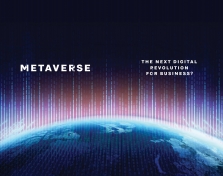Rethink, Rebalance, Restore

Editorial

Welcome to the latest edition of Prism
Not so many years ago, the popular idea of a business leader was someone who spent most of their time barking out commands and firing people. Fortunately, this stereotype has now largely disappeared. It's a measure of how far business has come - but also how far it still needs to go - that today we feel it is appropriate to dedicate this issue of Prism to the theme of Rethink, Rebalance and Restore, words that would not be out of place in an advertisement for a wellness retreat.
Don't worry, we're not suggesting that our readers take a couple of weeks out in a monastery in the Himalayas. But we do feel that in today's post- COVID-19, climate-challenged and increasingly uncertain environment, leaders do need to step back and reflect on the future of their business in a more profound way: rethinking their purpose and 'raison d'etre' rebalancing priorities and business models to suit changing stakeholder needs, and playing their part in restoring a thriving and sustainable future for society as well as business.
Our first three articles look at different aspects of this. First, how do you go about continuing to grow your business, especially in energy- intensive industrial sectors, while at the same time achieving Net Zero carbon impacts? We propose a framework to assist. Second, we focus on the critically important financial sector, and set out how financial services companies can rebalance their businesses to deliver on their commitments towards better environmental and social governance. And third, we zero in on the endemic challenge faced by businesses today: having made our long-term commitment towards sustainability, how do we actually deliver against our promises? Based on a recent survey, we show how significant the challenges of "walking the talk" are today, and suggest some good practices to accelerate progress.
As well as driving some spectacular healthcare achievements, the pandemic has also highlighted painfully the huge disparities in healthcare access between developed and developing countries. In our next article we analyze the problems and examine what industry and governments need to do to tackle this vital challenge for the future, including some key lessons to be learned from the developing markets themselves that could benefit all of us.
Finally, we turn to two other aspects of our technology-disrupted future. The metaverse is one of the most hyped topics in the business world at the moment. We give our perspective on the likely possibilities for business. In our final article on outcome-based business models, we look at how new technology, together with renewed impetus from sustainability concerns, is taking the shift from products to services to a new level.
We hope you enjoy the issue!
DATE

Editorial
Welcome to the latest edition of Prism
Not so many years ago, the popular idea of a business leader was someone who spent most of their time barking out commands and firing people. Fortunately, this stereotype has now largely disappeared. It's a measure of how far business has come - but also how far it still needs to go - that today we feel it is appropriate to dedicate this issue of Prism to the theme of Rethink, Rebalance and Restore, words that would not be out of place in an advertisement for a wellness retreat.
Don't worry, we're not suggesting that our readers take a couple of weeks out in a monastery in the Himalayas. But we do feel that in today's post- COVID-19, climate-challenged and increasingly uncertain environment, leaders do need to step back and reflect on the future of their business in a more profound way: rethinking their purpose and 'raison d'etre' rebalancing priorities and business models to suit changing stakeholder needs, and playing their part in restoring a thriving and sustainable future for society as well as business.
Our first three articles look at different aspects of this. First, how do you go about continuing to grow your business, especially in energy- intensive industrial sectors, while at the same time achieving Net Zero carbon impacts? We propose a framework to assist. Second, we focus on the critically important financial sector, and set out how financial services companies can rebalance their businesses to deliver on their commitments towards better environmental and social governance. And third, we zero in on the endemic challenge faced by businesses today: having made our long-term commitment towards sustainability, how do we actually deliver against our promises? Based on a recent survey, we show how significant the challenges of "walking the talk" are today, and suggest some good practices to accelerate progress.
As well as driving some spectacular healthcare achievements, the pandemic has also highlighted painfully the huge disparities in healthcare access between developed and developing countries. In our next article we analyze the problems and examine what industry and governments need to do to tackle this vital challenge for the future, including some key lessons to be learned from the developing markets themselves that could benefit all of us.
Finally, we turn to two other aspects of our technology-disrupted future. The metaverse is one of the most hyped topics in the business world at the moment. We give our perspective on the likely possibilities for business. In our final article on outcome-based business models, we look at how new technology, together with renewed impetus from sustainability concerns, is taking the shift from products to services to a new level.
We hope you enjoy the issue!
TABLE OF CONTENTS

GROWTH IN A NET ZERO WORLD
Government action, at both a national and international level, has therefore set the playing field for companies, in many cases radically transforming the landscape they currently operate in. The onus is now on companies, particularly in asset-intensive industries such as energy, oil & gas, chemicals, industrials, construction, steel and cement, to transform their business models and operations if every country’s Net Zero pledges are to be delivered on. For example:

ACTIVELY SHAPING THE FUTURE - THE NEW IMPERATIVE FOR FINANCIAL SERVICES
Seizing the initiative around sustainability and demonstrating true leadership can transform how the sector is viewed – by consumers, regulators, and existing and potential employees. It provides the opportunity to fundamentally reposition financial services away from being seen as part of the problem, to leading the solution.

WALKING THE TALK ON CORPORATE SUSTAINABILITY
Business has a crucial role to play, accounting for some two-thirds of global greenhouse gas emissions1. Most businesses in the developed economies have already taken at least some measures, however limited, to reduce carbon footprints in the last 20 to 30 years. Today the pace of action within businesses is rapidly accelerating – though some observers would criticize business for achieving too little, too late.

COVID-19 – FOCUSING ATTENTION ON THE NEXT TRANSFORMATION IN HEALTHCARE
Essentially the pandemic has shown the strengths and weaknesses of the global healthcare sector – and the opportunities that exist for improvement and transformation. While demonstrating what can be achieved through global collaboration, COVID-19 has also shone a harsh light on the disparities in healthcare access between developed and developing countries.

METAVERSE - THE NEXT DIGITAL REVOLUTION FOR BUSINESS?
A revolution powered by VR has been promised for decades, but it’s only recently that improvements in hardware and software, together with a new level of consumer engagement, have started to converge to create something that could be genuinely disruptive in the foreseeable future. If you are in the business of gaming or entertainment the potential is clear, but what could the metaverse mean for the rest of the business world, and what are some of the challenges that will need to be overcome?

SELLING CUSTOMER OUTCOMES - A BUSINESS MODEL TRANSFORMED
However, for most organizations this transition has only gone so far. They may have added subscription services to their offerings, but have not yet gained full value by implementing outcome-based business models (OBMs), in which customers purchase a guaranteed outcome to meet their needs.



